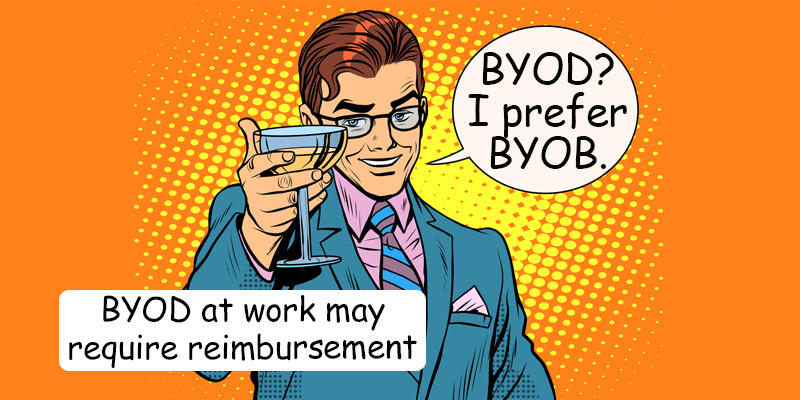If you have an employee who drives their personal vehicle for a work related matter, it is the norm to reimburse the employee for the business-related use. It is a straight forward calculation by taking into consideration how many miles the person drove and multiplying it by a rate. The IRS even publishes a standard mileage rate of .58 cents per mile (2019). But what if that employee uses their mobile personal device (aka cell phone) in a Bring Your Own Device (BYOD) workplace?
As employers implement paperless, streamlined, and automated solutions to their work environment, we are finding that the requirement for employees to use their personal device for business-related use is increasing. A Gartner study from a few years ago predicted that in 2017 half of all employers will require workers to supply their own device for business-related use. For the employer, it is an inexpensive means to a solution, for example, a company may not have to purchase an expensive time clock by having their employees utilize their personal device to punch in and out each day.
This brings up the big question. Can employers require their employees to use their personal device? The answer is yes, but it is suggested, or may I even go as far as saying required, to treat it in the same manner as the business use of their personal vehicle.
I say required, because for those businesses with employees in California (where else), there has been a precedence set by the case Cochran v. Schwan’s Home Services, Inc., where customer service managers who were not reimbursed for business-related use of their personal device. The court held that “when employees must use their personal cell phones for work-related calls, Labor Code section 2802 requires the employer to reimburse them. Whether the employees have cell phone plans with unlimited minutes or limited minutes, the reimbursement owed is a reasonable percentage of their cell phone bills.”
What is the definition of “reasonable percentage”? Unfortunately, the court sidestepped that can of worms. A look at Verizon’s current data plans and one can get a 2GB data plan for $35/month. Let’s say the employee is using their personal device as a timeclock and punching in/out four times a day. The typical work day with a lunch break. For those who know the relative size of data will know that I am taking a HUGE margin on the side of caution and say that each punch is going to utilize 1MB of data transmission. Multiply that by four punches a day, multiplied by an approximate 22 work days in a month, and we arrive at 88MB. 88MB at the Verizon data plan rate noted above, and that amounts to $1.54 total for the month. Not a whole lot, plus I greatly exaggerated the data usage just to show that it is a relatively small amount. From the IRS perspective, the reimbursement would not be taxable to the employee as long as the reimbursement is not more than the cost. I would also point out that in the California case, the court indicated that a reimbursement is in order even if the employee has an “unlimited” plan and there may not be an ability to calculate a specific rate. How do you put a price on a plan with unlimited minutes or unlimited data?
As a completely separate issue for consideration is the employee who utilizes their personal device for work related matters while not ‘at work’. Under the Fair Labor Standards Act (FLSA), employers must pay at least minimum wage to nonexempt employees for all hours the employee is “suffered or permitted” to work by the employer. When employees have remote access, the hours worked can include time spent utilizing their personal device by responding to emails, taking calls, and performing other functions.
In summary, if you require your employees to utilize their personal device for business-related use, then be sure you have a reimbursement plan that you can stand behind in the event of a claim. Incorporate a clear BYOD policy in your employee handbook that requires employees to record and report all time worked and set a clear policy on working outside of normal scheduled hours.
While I make every attempt to ensure the accuracy and reliability of the information provided in this article, the information is provided “as-is” without warranty of any kind. PayMaster, Inc or Romeo Chicco does not accept any responsibility or liability for the accuracy, content, completeness, legality, or reliability of the information contained. Consult with your CPA, Attorney, and/or HR Professional as federal, state, and local laws change frequently.

